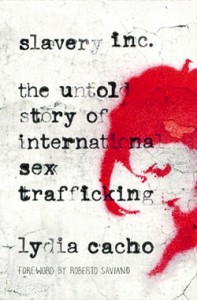SLAVERY INC. The Untold Story of International Sex Trafficking

Human trafficking—for sex, labor, and even organ selling—is among the most profitable businesses in the world, yet it is ignored or minimized by governments and mainstream society. Worse than governmental ignorance, perhaps, is the unwitting contribution that well-meaning but uninformed travelers make to this thriving industry. Renowned Mexican journalist Lydia Cacho captured this world in her 2010 book, Esclavas del Poder (“Slaves of Power”), and peeled away the myths surrounding the trafficking industry to reveal the truth of this human tragedy. This year Elizabeth Boburg brings the English-speaking world her translation of Cacho’s work, retitled, Slavery Inc.: The Untold Story of International Sex Trafficking.
From Turkey to Thailand, from Burma to Argentina, Cacho chronicles the stories of victims of human trafficking, along with the efforts of NGOs and the UN to rescue them. She paints a vivid picture of how free markets and a borderless world contribute to the spread of this affront to humanity, offering a crash course in how both legal and illegal commerce form a backbone for the enslavement of women and children in the sex tourism industry, for the production of child pornography, and for forced labor.
Cacho’s reporting has seen her imprisoned and tortured in the past. Here, she recounts the confrontations she’s had with members of organized crime and corrupt military and police officials. These powerful men, both within and outside the “legal” establishment, have vested interests in the ongoing market for human beings. Cacho explains the role complicit governmental officials play in the illegal migration of trafficked persons and how the laundering of money from these ill-gotten gains occurs. Boburg’s translation captures the intensity of Cacho’s writing and makes palpable the pain of the victims and the frustration of those trying to help them.
While discussions of autonomy and freedom of choice are integral parts of any humanist discussion, far too often the real world details are lost in a haze of philosophical debate. Cacho’s book bridges the gap between clinical, some might say cynical, reports published to expose the human trafficking industry and first-person narrative. Her discussion pays particular attention to the role that legal, non-coercive prostitution plays in setting the stage for the development of illegal and enslaving conditions. While personal autonomy is something humanists value highly, Cacho makes a persuasive case that the freedom to sell or use one’s body must be considered along with an informed view of the socioeconomic, political, and criminal motives that form the context in which that choice is made.
Slavery Inc. is by no means a light or fun read. It renders the reader at turns flummoxed and disgusted at the ordeals experienced by the victims. The tone and intensity of her reporting is exemplified in the story of a woman called Sarah, who’d been forced into prostitution by the Yakuza crime syndicate in Japan.
“Several Yakuza appeared before me,” Sarah recounts in the book. “They were naked, except for white towels wrapped around their waists. Their bodies were completely covered in tattoos. Sitting on the couch, I became overwhelmed by fear; absolute terror consumed me.”
Cacho continues Sarah’s testimony of being raped by forty men over a period of twenty-four hours and the mistreatment she received by police officers when she reported her assault. Cacho’s writing captures dozens of first-person accounts from children, adolescents, and adult survivors of these horrors. She shares their stories and her own experiences of the conditions of their lives before and after becoming slaves in a frank yet empathetic way. When one considers that many of these victims are minors who are sold for the production of child pornography (some children as young as four), it’s difficult not to be overwhelmed by the subject.
Cacho does more than mere reporting, however. She offers thoughts on a way forward and resources for individuals who want to support rescue efforts, as well as sources to help consumers determine if the manufacturers they purchase from, or the hotels they stay at when traveling, have made efforts to reduce or eliminate complicity in human trafficking. She also offers thoughts on how to reduce the demand for slaves and the role that men must play in ending human trafficking, a discussion from which they are too often absent.
